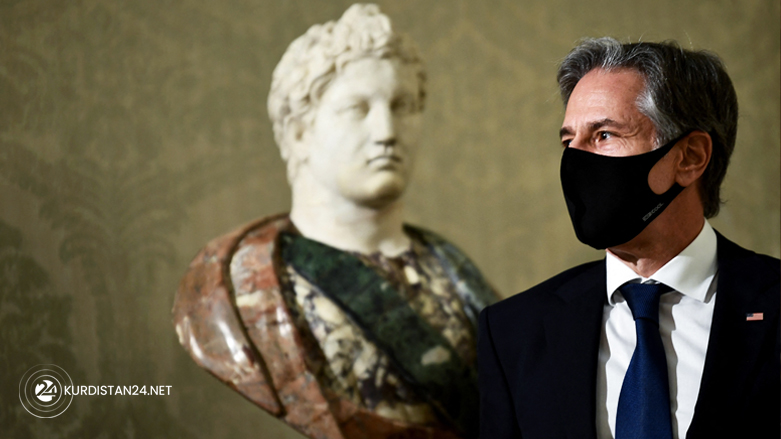US warns Iran on nuclear program

WASHINGTON DC, United States (Kurdistan24) – US Secretary of State Antony Blinken made the strongest US statement to date on the need to resume talks with Iran on restoring the 2015 agreement on Iran’s nuclear program, known as the Joint Comprehensive Plan of Action (JCPOA.)
“Iran, unfortunately, is moving forward aggressively with its program,” Blinken told CBS’ Sunday morning interview program, Face the Nation. “The time it would take for it to produce enough fissile material for one nuclear weapon is getting shorter and shorter.”
He also cautioned that the benefits from returning to the JCPOA are diminishing with time.
“The other thing that’s getting shorter is the runway we have where, if we do get back into compliance with the agreement and Iran gets back into compliance, we actually recapture all of the benefits of the agreement,” Blinken said. “Iran is learning enough, doing enough, so that that’s starting to be a problem.”
Six rounds of talks were held in Vienna, Austria earlier this year on reviving the JCPOA. Those discussions involved negotiations between Iran and the P-5 + 1—the five permanent members of the UN Security Council, plus Germany.
Tehran, however, refused to speak directly with the US, so the other parties acted as intermediaries between Washington and Tehran.
Those talks have been suspended since June, when Ebrahim Raisi, a hardline cleric, was elected Iran’s new president.
The Biden administration’s initial reaction to Tehran’s suspension of the JCPOA negotiations was to reiterate, repeatedly, its readiness to return to them.
Read More: US reaffirms commitment to pursuit of JCPOA—despite Iran’s kidnapping plot and nuclear stalemate
Iran was not interested, however. Raisi assumed office on August 3, and he has since appointed a tough negotiating team, led by individuals opposed to a return to the JCPOA.
Moreover, since 2019, Iran has been violating the terms of the nuclear accord by enriching uranium to ever-higher levels; producing prohibited materials; and increasingly limiting oversight of its nuclear activities (which are supposed to be for civilian purposes) by the International Atomic Energy Agency (IAEA.)
It is widely believed that Tehran is using the current stalemate to advance its nuclear weapons program, as Blinken suggested.
He also hinted at the possibility of US military action. “We still believe diplomacy is the best path forward,” he said, but we are “also looking at, as necessary, other options, if Iran is not prepared to engage quickly in good faith to pick up where we left off in June, when these talks were interrupted by the change of government in Iran.”
Asked, “Other options, does that include military?,” Blinken responded, “As we always say, every option is on the table.”
US Skepticism about Iran’s Intentions
On Wednesday, the new chief of Iran’s nuclear negotiating team, Ali Bagheri Kani, tweeted that Iran was ready to resume talks before the end of this current month.
But the Biden administration is “highly skeptical” about Tehran’s proposal, CNN reported on Friday, as the president and his top aides, including Blinken, flew to Rome to attend a summit of the G-20 (the countries with the world’s 20 largest economies.)
Biden met in the Italian capital with the French, German, and British leaders to discuss Iran. Afterwards, they issued a joint statement which expressed “their determination to ensure that Iran can never develop or acquire a nuclear weapon,” along with their “grave and growing concern” at Iran’s halt to the JCPOA negotiations, even while Tehran has “accelerated” its “provocative nuclear steps,” including “the production of highly enriched uranium and uranium metal,” while it has “decreased cooperation and transparency” with the IAEA.
However, the joint statement emphasized the need for diplomacy, rather than threaten Iran with a military response to its noncompliance.
“The current situation underscores the importance of a negotiated solution,” the joint statement said, which “provides for the return of Iran and the US to full compliance with the JCPOA and provides the basis for continued diplomatic engagement.”
“We call upon President Raisi to seize this opportunity and return to a good faith effort to conclude our negotiations as a matter of urgency.”
It added an oblique warning—“that is the only to avoid a dangerous escalation, which is not in any country’s interest”—even as the dominant tone of the statement was to emphasize diplomacy.
The difference between Blinken’s interview and the joint statement suggests that if the US should determine that Iran’s nuclear program had become an imminent danger, it still might have difficulty gaining the support of its European allies for such a move.
In that case, Israel, which regards a nuclear-armed Iran as an existential threat, might take military action on its own.
Iran had no immediate response to the joint statement.
